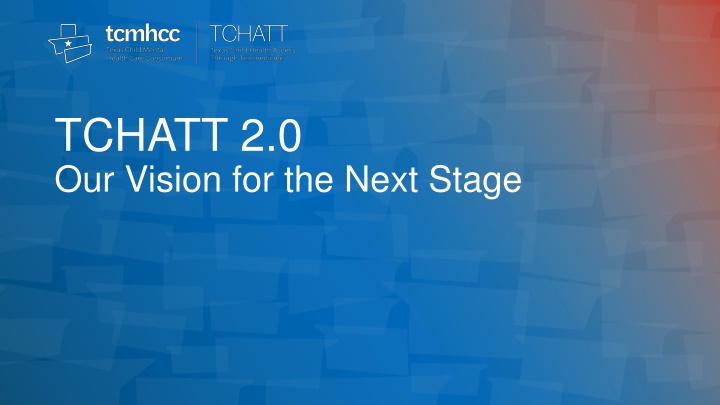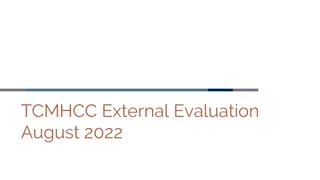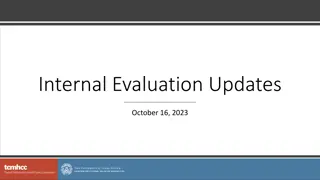
Transforming Access to Mental Health Services in Texas
Enhance access to mental health care in Texas through TCHATT 2.0, a program designed to provide free, evidence-based services for students. The initiative aims to address behavioral health needs early, involve parents and caregivers, and leverage technology for improved care coordination. Learn about the program's goals, implementation timeline, service model, and key features.
Download Presentation

Please find below an Image/Link to download the presentation.
The content on the website is provided AS IS for your information and personal use only. It may not be sold, licensed, or shared on other websites without obtaining consent from the author. If you encounter any issues during the download, it is possible that the publisher has removed the file from their server.
You are allowed to download the files provided on this website for personal or commercial use, subject to the condition that they are used lawfully. All files are the property of their respective owners.
The content on the website is provided AS IS for your information and personal use only. It may not be sold, licensed, or shared on other websites without obtaining consent from the author.
E N D
Presentation Transcript
TCHATT 2.0 Our Vision for the Next Stage
Build on the expertise of the States academic health related institutions Assure parent/caregiver involvement and consent Offer services for free Address behavioral health needs early Referrals primarily from Texas public schools Give every district in the State the opportunity to offer the service Utilize technology Engage small and rural districts Program Goal: Improve Access to Care 2
Incorporates lessons learned during the design and implementation phase Builds on the assets/expertise each HRI brings to the work Creates cohesion among HRIs Enables resource sharing statewide Balances standardization and HRI flexibility Moves TCHATT forward to accommodate growth TCHATT 2.0 Description & Benefits 3
TCMHCC EC approves budgets Staff training on scale administration and interpretation Timeline TCHATT Leadership Summit Discuss TCHATT 2.0 with TCMHCC Executive Committee Begin launch of TCHATT 2.0 HRIs revise FY25 budgets and develop FY26-27 budgets UTS/COSH finalizes policies and training materials August/ February 2024 April 2024 June 2024 September 2024 January/February 2024 March 2024 May 2024 July 2024 TCMHCC Executive Committee approves TCHATT 2.0 UTS/COSH refine policies and training materials Policies and training materials are shared with HRIs Discuss TCHATT 2.0 with TCHATT HRI Leaders and ARPA Leaders UTS/COSH begins developing policies and training materials COSH provides implementation support to HRIs 4
TCHATT 2.0 Service Model Free Evidence- and Measurement-Based Characteristics Telehealth/Telemedicine School-Based Referrals Quick Access Child Focused Individualized Statewide Culturally and Linguistically Relevant Non-Urgent Short-Term/Intermediate Care Short-Term Early Intervention Assessment Care Coordination Components Intermediate Services Data Management System Workforce Development Resource and Referral Database Mental Health Education & Training
Characteristics TCHATT services will be provided at no cost to students, parents/guardians, and schools. Free School-Based Referrals The primary source of TCHATT referrals will be from public schools. Once parent/guardian consent is obtained, referrals will be submitted in Trayt. Referrals from other sources may be accepted if the HRI has capacity, or they may be referred to other services, leveraging other Consortium programs, PCPs, care coordinators, and Welnity. 6
Characteristics Referrals will be processed by the school s designated HRI. The HRI will review the referral, obtain parent/guardian consent, and conduct an initial assessment, including administering all screening tools. If the HRI does not have capacity to review the referral and see the child and family in a timely manner, they will be transferred to an HRI with capacity to prevent a waitlist. HRIs will mitigate waitlists and triage referrals if waitlists exist. Quick Access Crisis services are not provided by TCHATT. TCHATT services will focus on students with non-urgent needs who will benefit from short-term treatment. Intermediate services may be permitted if clinically indicated and there are no services available to refer the child to. Non-Urgent Short-Term/ Intermediate Care 7
Characteristics All therapy services will be individualized, based on the strengths and needs of the child and family. Treatment modalities will be informed by the results of the diagnostic assessments administered at intake to assure presenting needs are prioritized and addressed. If it is determined that specialized treatment is needed from an HRI with expertise in a particular approach, a referral will be made to that HRI to accommodate the child and family's needs. Individualized Telehealth/ Telemedicine Services will be provided via telehealth/telemedicine, primarily on the school campus. HRIs may offer home-based and/or after-hours sessions. In-person sessions will transition to online sessions, or children will be referred to suitable in-person treatment, leveraging other Consortium programs, PCPs, care coordinators, and Welnity. 8
Characteristics TCHATT provides behavioral health services primarily to Texas public school students. Child Focused Culturally and Linguistically Relevant Services will be culturally-informed and provided in the language preferred by the child and their family. Parent/guardian and student preferences will be prioritized. Family satisfaction will be measured, monitored, and used to drive program improvements. Evidence- and Measurement- Based Standardized screening will be administered at intake. Scores above the clinical range will prompt additional assessment from the intake clinician to determine the appropriate course of treatment. This may include referral to intermediate services. Follow-up scales will be completed by the assigned clinician at every three-visit interval if the initial screen is above the clinical range. Treatment and services will be evidence-based. 9
Characteristics HRIs will continue to outreach to and onboard non-active public and charter schools. All TCHATT services will be available for all referred students, once parent/guardian consent is obtained. Statewide Each HRI will process referrals from schools with an active MOU with the HRI. Following referral and assessment, HRIs will provide short-term early intervention services to students who meet eligibility criteria. Following referral and assessment, if the student s condition requires care that is beyond short-term early intervention, the HRI will attempt to locate more appropriate community-based services. If no services exist and the HRI has capacity, the HRI may, but is not required to, provide intermediate services to the student. If no services exist and the HRI does not have capacity, the HRI may coordinate with other HRIs to transfer the child to another HRI for services. Students will receive services at home if the HRI providing services does not have an active MOU with the referring school. Higher acuity cases will be referred to more appropriate treatment, leveraging other Consortium programs, PCPs, care coordinators, and Welnity. 10
Components All HRIs will assess behavioral health needs of every youth referred to TCHATT using a standard set of assessment scales. Assessment and clinician judgment will identify treatment needs and assist with referring to other HRIs as needed. Assessment Care HRIs will provide family-centered care coordination to share information and connect children and their families to other community-based resources and supports to address their needs. This may include referrals to Family Peer Support Specialists or Community Health Workers, if available in the family s community. TCHATT providers will coordinate care amongst HRIs and other community- based providers to ensure enrollment, continuity of care, leverage statewide capacity, expertise, and training. HRIs will obtain the child s primary care provider (PCP) information from the parent/guardian and obtain consent to share information with the PCP, if needed. Coordination with the student s school will occur when appropriate and allowable. Coordination 11
Components Mental Health Education Training and education to school staff and families will be provided by HRIs. HRIs may, but are not required to, implement the Youth Aware of Mental Health educational program in their regions. The Consortium will provide Welnity to serve as a central resource and referral repository. HRIs will collect and maintain referral and resource information in Welnity to connect TCHATT families with care in the community when required. Resource and Referral Database Workforce Development All TCHATT clinicians will be trained to administer and interpret all assessment scales. Trainees will be recruited and supervised at all HRIs. When HRIs provide intermediate services, staffing should be through an integrated model, enabling a mixed caseload of short-term and intermediate services for clinicians. Staff will have access to professional development opportunities, including training on specialized treatment modalities. 12
Components Trayt will serve as the centralized data management system for referral submission and tracking. Schools will submit referrals in Trayt, and HRIs will process referrals, enroll new referrals, enter session data, and discharge children using Trayt. Institution EHRs will serve as the official patient record. Data Management System Short-Term Early Intervention The majority of TCHATT services will focus on short-term early intervention for mild acuity cases, with an intake appointment and a treatment course with up to 8 sessions. HRIs may, when clinically indicated, provide psychiatry/medical management services. Intermediate services for moderate acuity that go beyond 8 sessions may be permitted if clinically indicated and there are no services available to refer the child to. Higher acuity cases will be referred to more appropriate treatment, leveraging other Consortium programs, PCPs, care coordinators, and Welnity. 13
Components Intermediate Services In moderate acuity cases where a referred student requires longer-term care based on clinical judgment and a good-faith effort has been made to identify outside services but none are available, HRIs may offer intermediate services, which are up to 20 sessions depending on treatment needs and modalities. This may include specialty services (anxiety, trauma, substance use) and bridge services (services provided while waiting for long-term community services). If no services exist and the HRI has capacity, the HRI may, but is not required to, provide intermediate services to the student. If no services exist and the HRI does not have capacity, the HRI may coordinate with other HRIs to transfer the child to another HRI for services. Students will receive services at home if the HRI providing services does not have an active MOU with the referring school. Higher acuity cases will be referred to more appropriate treatment, leveraging other Consortium programs, PCPs, care coordinators, and Welnity. 14
What does this mean for TCHATT ARPA projects? ANXIETY, ASUD, AND TRAUMA SERVICES YAM EVIDENCE-BASED GROUPS EXPANDED STATEWIDE. CONTINUED. ADDITIONAL FUNDING DISCONTINUED. UP TO 20 SESSIONS. POTENTIAL EXPANSION IN HRI AREAS NOT CURRENTLY INVOLVED. ASUD SERVICES - SPECIFIC ELIGIBILITY CRITERIA. COORDINATED WITH HHSC. HRIS NOT CURRENTLY PARTICIPATING MAY CHOOSE TO PROVIDE THIS SERVICE IN THEIR AREA OR REFER TO ANOTHER HRI. 15
What does this mean for TCHATT ARPA projects? EXTENDED SESSIONS STATEWIDE COVERAGE BILINGUAL SERVICES CONTINUED AS AN INTERMEDIATE SERVICE PROVIDED AT EACH HRI S DISCRETION. CONTINUED. PARENT SUPPORT GROUPS DISCONTINUED. LINGUISTICALLY RELEVANT SERVICES CONTINUED. UP TO 20 SESSIONS. 16
TCMHCC EC approves budgets Staff training on scale administration and interpretation Timeline TCHATT Leadership Summit Discuss TCHATT 2.0 with TCMHCC Executive Committee Begin launch of TCHATT 2.0 HRIs revise FY25 budgets and develop FY26-27 budgets UTS/COSH finalizes policies and training materials August/ February 2024 April 2024 June 2024 September 2024 January 2024 March 2024 May 2024 July 2024 Discuss TCHATT 2.0 with TCHATT HRI Leaders and ARPA Leaders TCMHCC Executive Committee approves TCHATT 2.0 UTS/COSH refine policies and training materials Policies and training materials are shared with HRIs UTS/COSH begins developing policies and training materials COSH provides implementation support to HRIs 17


